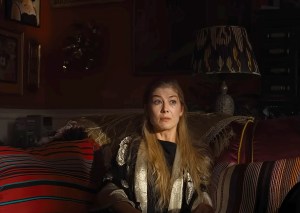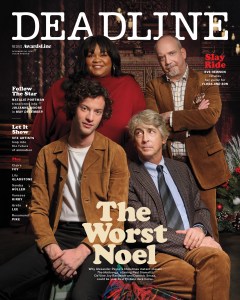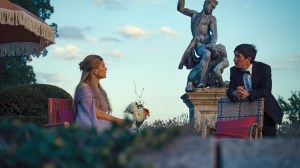As Elspeth Catton, Saltburn’s bohemian but bloodless matriarch, Rosamund Pike strikes an unnervingly accurate note as the crushingly careless mother of Jacob Elordi’s character Felix. When Felix brings home Oliver (Barry Keoghan), his apparently lame duck of a new friend from Oxford University, Elspeth is delighted to add a new tragic case to her collection of playthings. Already among them is Carey Mulligan’s lost soul character, Poor Dear Pamela — an old friend on the run from a messy breakup with a Russian oligarch. Here, Pike pays tribute to the world created by writer-director Emerald Fennell, and its unpredictable outcome.
DEADLINE: As a Brit like you, I’ve been waiting for someone to skewer this upper-class world for so long — there are rules that you’re never told, and if you figure out what they are, they change into something else, so you are never allowed to fit in or get it right.
ROSAMUND PIKE: No. If you’re overdressed, you’re wrong, or if you’re underdressed. You are somehow wrong and you don’t quite know why or how. And even being an actress is wrong, for a start, because it means you take something seriously, and it’s not really the done thing to take anything too seriously. I really care about acting, and I’m very serious about it, and I’d be a terrible bore to someone like Elspeth. There would always be people who would say to me, ‘Oh, you got some work? You’ve got a film? Clever you,’ and you just know that you’re hearing nice words like ‘clever you’ and you just know it’s a criticism. So to be Elspeth was really refreshing, it was really fun to be able to live inside that skin.
DEADLINE: I remember going on holiday with a really posh family when I was 14 and the mother announcing to me at breakfast, “You know, guests are like fish. After three days they smell.”
PIKE: Oh my god. That could come straight out of Elspeth’s mouth! And she would’ve thought she was saying something funny.
DEADLINE: Tell me about the first meeting you had with Emerald about this role and when you knew you wanted to play Elspeth?
PIKE: Well it was a bit like when I first met David Fincher. You think you are having a conversation with someone, just a general conversation, and then at some point later on you realize that that’s absolutely not how these people work. They’re not ever having a general conversation. They’ve absolutely got an idea and they’re seeing whether you fit. And there was a certain point where clearly Emerald believed wholeheartedly that I fit. Emerald clearly had this idea that I had what she wanted for Elspeth, and I didn’t realize that she was offering it to me. But I think she’s very clever because she sows seeds from that first moment, right through to when you’re filming, and she, in a very roundabout way, plants the seeds of exactly what she’s expecting of her cast, which is total camaraderie, no isolation on set, together all the time, don’t step away, have fun.
You do have films where an actor will come, and you realize they’ve got it all bottled up and they know exactly what they’re going to do, and would do exactly the same whether it was you playing the other character or somebody else. But I think Elspeth is Elspeth because Richard [E. Grant] is her husband and Jacob’s her son and Alison [Oliver]’s her daughter, and Carey is Pamela. It’s in relation to all those people. There’s a version of Elspeth, but the specificity of Elspeth is because of everybody else.
I think with Carey and I, because we knew each other since she was 18 and I was 24, for Pride and Prejudice, we have this familiarity and shorthand. Sisterly things. So, I’m sure that feeds in, I’m sure I knew it would feed into what you feel with Elspeth and Pamela.
Rosamund Pike and Barry Keoghan.
MGM/Everett Collection
DEADLINE: When we first meet Elspeth it’s her and Pamela gossiping about Oliver behind his back. Was that a bit of improvisation just between you and Carey?
PIKE: Yeah, it was. Emerald allowed us to usually improvise our way into most scenes, and sometimes little bits of that are captured. It was fun with Elspeth because I could just look up anything from 2006/7 and riff on it at dinner. It was the time that Keith Richards was reported to have snorted his father’s ashes…
DEADLINE: Oh my god, yes.
PIKE: Which was later discovered, I think, to be not true. But Elspeth was like, “Oh, of course I knew Keith. Of course. Absolutely. Of course, he always said he’d snort his father’s ashes. When we were in Mustique, he had his ashes with him. He offered all of us his ashes.”
So basically, any story from Heat [a British tabloid magazine], or whatever at the time, I could just riff on at dinner. I had a ball because I’m not a great improviser unless I know exactly who the character is, and with Elspeth, I just had to pitch everything to the most extreme and most vain version of whatever it was. She’s usually getting any story and placing herself in the center of it. And it was really fun to just live in that shallow space. And of course, but then because we’d been having so much fun, it came as a shock to us as well as the characters when tragedy falls.
Emerald is unusual. She cares very deeply about these characters, she’s always so funny. But underneath, you realize she feels and cares hugely and is devastated by what happens in the film. And one of the things she said when Elspeth discovers Felix [dead] in the maze was, “I’ll never show that. You can never see a mother’s grief on film. It’s just too awful. It’s too much.” So, by the time we hear Elspeth, and by the time the others come in, she’s already battened down the hatches and buried the feelings, immediately overridden it and suppressed it. But that doesn’t mean I didn’t have to play it [off-camera].
We never see what Elspeth looks at, Jacob was there in full makeup, generous person that he is, for me to have that experience. So, for me, as Elspeth, I have that as an absolute reality, even though the audience has never seen it. That’s Emerald. That’s how she as an actress understands what an actor needs.
I couldn’t have just said, “Darling, come away. It’s lunch,” if Elspeth hadn’t already been through her moment in private, or the beginnings of it, and immediately numbed. We just see her once the shock has set in. And I think some people maybe miss that, or don’t understand that those social codes become absolute lifelines for certain members of the British upper class who’ve never really been taught to deal with their emotions ever, because of boarding school, being raised by people who don’t love them. And so an emotion is a terrifying thing. So that’s why you have to cling to drinks and dinner and lunch and things like that, because it shows you how to behave.

Pike in Saltburn.
MGM/Everett Collection
DEADLINE: It’s embarrassing in that kind of culture to show yourself, it’s sort of shameful.
PIKE: Yeah. Why is that? It’s just insane, isn’t it?
DEADLINE: I think it’s generational avoidance.
PIKE: Which has become, to show an emotion is self-centered.
DEADLINE: Like caring about acting. Never show too much care.
PIKE: Keep everything light, not caring, not trying too hard, but behave perfectly. I also loved the way she did the breakfast scene, the completely baffling rules about eggs are ordered and everything else is on the side. Why?
DEADLINE: Just a tradition to make people feel excluded if they get it wrong.
PIKE: I wonder how it plays… Does the same creature exist in America?
DEADLINE: I think there’s a certain posh East Coast aristocracy that does a similar thing, so it really does translate. Did you have any sense that Emerald was going to make us look long and hard at some really uncomfortable stuff?
PIKE: Well, I did because Linus [Sandgren], our wonderful cinematographer, would show us photographs from the day before. And some of them you’d think, ‘My god, what is that? That’s somebody’s bottom, or some really intimate part of the body!’ And it would actually only be a shoulder. But it was the way it was looked at, the gaze was so erotic and so intimate and uncomfortable that you kept thinking you were looking at something more shocking sometimes than you actually were. And then vice-versa, something would seem like it was benign and suddenly you’d be like, ‘Oh, it’s not at all.’
I remember being very uncomfortable when I first saw the film. I couldn’t really watch myself at all. I hated how I found it uncomfortable the way Elspeth was… I don’t know quite what it was, I was made to feel quite uncomfortable. I think the camera is so personal, the lens is so close and you really see everything. And our editor was very, very fine and detailed.
So yeah, I was shocked and very uncomfortable, the first time I saw it, for sure. And I regret never having the experience that others will have, being taken on the ride. But maybe, sometimes that can come in a few years’ time.

Read the digital edition of Deadline’s Oscar Preview issue here.
DEADLINE: What about in the script?
PIKE: I think the script fooled many people. I don’t think we did know. She added things like the scene with Barry and Archie [Madekwe] where Oliver comes to Farleigh in the night and gives him a hand job and almost spits in his mouth. She just said, “Oh, I’ve written another scene.” And the amazing speech that Archie does to Barry, where Archie says, “This for me is life, and for you, you’re going to look back and this was just a hand job in a golden haystack big boy summer.” I was like, who writes that?
DEADLINE: It’s so good.
PIKE: How does that even come out of you? When? How? Because it’s exactly what it is, a hand job in a haystack golden big boy summer. If someone just dropped that in my lap saying, “These are your lines for tomorrow,” I would rejoice. Everything that comes out of her mouth, or out of her pen, it’s just specifically delicious.

